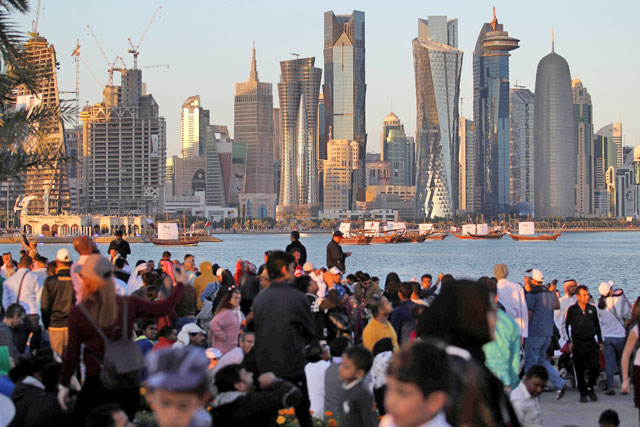DUBAI — A rise in tension between Qatar and the United Arab Emirates in a row over military flights threatens US strategic interests in the Gulf and could benefit regional rival Iran.
Abu Dhabi says Qatari air force jets intercepted two UAE civilian aircraft on commercial flights to Bahrain last month, and Doha says UAE military aircraft violated its airspace on December 21 and January 3.
Each denies the other's accusations and the two energy-producing states have sought to ease the dispute. The risk of a confrontation between them has increased but a war between them is unlikely, regional experts say.
The increase in tension, seven months after the UAE, Saudi Arabia, Bahrain and Egypt imposed travel and trade sanctions on Qatar over accusations — denied by Doha — that it supports terrorism and regional rival Iran, has alarmed Washington.
“When you have Qatari [military] planes being scrambled near a civilian airliner, it runs the risk of an incident that, even unplanned, could result in the loss of lives and escalate this into an situation Gulf countries have never had among each other,” said a Western diplomat, speaking on condition of anonymity.
Gabriel Collins, an expert on financial sanctions at Rice University in Texas, said “military posturing” against a background of underlying tension because of the diplomatic and trade sanctions “left space for a miscalculation”.
“A very small spark can, in a worst-case scenario, light a huge fire,” he said.
US Defence Secretary James Mattis has said the fracturing of ties among its Gulf Arab allies hinders Washington’s fight against Daesh, and “countering the spread of Iran’s malign influence”.
Iran has criticised the restrictions on Qatar and called for the rift to be resolved through dialogue. Foreign Minister Mohammad Javad Zarif has lamented what he called a “dialogue deficit” in the region.
The Gulf is a strategically important area for the United States. The US Fifth Fleet is based in Bahrain and the Al Udeid airbase in Qatar is a centre of its air operations against Daesh.
“The United States considers both Qatar and the UAE to be critical regional partners,” a US Air Forces Central Command spokesman in Qatar said in response to a Reuters request for comment on the incidents. He called for “meaningful solutions to reduce tensions”.
The base would be crucial if the United States were to go to war with Iran, which Washington says sponsors terrorism and is a threat to stability and US interests in the Middle East. Tehran denies the accusations.
Regional rivalry
Predominantly Sunni Muslim Saudi Arabia also sees Iran as a threat to regional stability and regards the Islamist Republic, which is majority Shiite, as its main rival in the region.
But more than any of the countries boycotting Qatar, the UAE bristles at alleged Qatari support for Islamists throughout the region and maintains a hard line against the Muslim Brotherhood, branches of which are supported by Doha in some countries.
There are trade risks for the West as well as security concerns.
“The rivalry between Saudi Arabia and its Gulf allies with Iran is raging. These are key trade and security partners to the West for decades and if they are divided and very nearly coming to military blows, in this zero-sum atmosphere, Iran stands to gain and the US to lose,” another Western diplomat said.
An Arab official, speaking on condition of anonymity, said the UAE, because of its competing regional vision with Qatar, wanted to pile pressure on Doha to signal a reconciliation is not close and the boycott will not soon end.
“Saudi Arabia and the other quartet countries have little to fear for their economies from this crisis, though Qatar does,” the official said.
“Also, because the UAE is so interested in enforcing its demands on Qatar and curtailing its activities in the region, that makes the two countries eager to prove in this phase that they won’t be giving up soon and can escalate if necessary.”
US President Donald Trump appears to have softened his view of Doha.
He initially blessed the boycott, accusing Doha of funding terrorism “at a very high level”. But he offered in September to mediate and this month telephoned Qatar’s ruler, Sheikh Tamim Bin Hamad Al Thani, to thank him for his counter-terrorism efforts.
The change follows a charm offensive by Doha, which in recent months has hosted several right-wing commentators close to the president and matched the UAE’s lobbying efforts in Washington.
The change appears to reflect a political calculation among the Gulf states’ Western partners that Qatar would not risk allowing the rift with the UAE to deteriorate further, one of the Western diplomats said.
